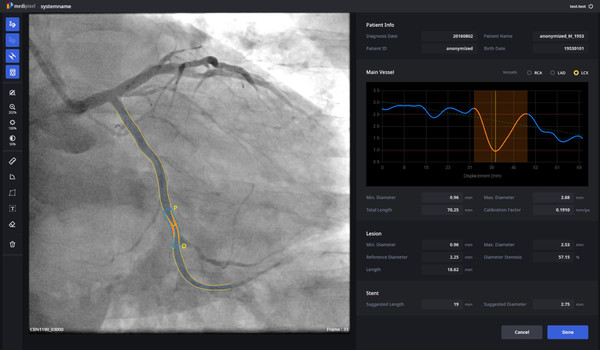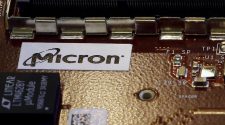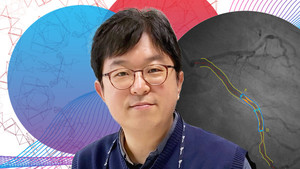“I’m a developer-turned-entrepreneur. I developed products that almost every Korean household used, such as AhnLab’s V3 vaccine (an antivirus software program). The same goes for the healthcare field. I know how to make a healthcare product that every hospital will use.”
Song Kyo-seok, CEO of Medipixel, had confidence in his eyes, drawing blood vessels on a piece of paper to explain the company’s medical diagnostic program.
During an interview with Korea Biomedical Review, he said he did not want to sound presumptuous.
However, when asked about the company’s technology, he said it was “the world’s best.”
“Medipixel XA, an automated cardiovascular vessel analysis program, analyzes cardiovascular images in the shortest time with the best performance. I’m sure our technology is the world’s best in the current era,” Song said.
It takes only one second for Medipixel XA, a software program using deep learning, to detect cardiovascular contours and lesions.
There is no need to manually designate the division range or to perform a new operation for each lesion.
The program identifies the main blood vessels and individual lesions located in branch blood vessels and recommends a customized stent. It plays its role as an assistant device used in real-time at the operation site.
“When using existing products, physicians had to wait for three to five minutes to have results after designating the segmentation range manually. So how can they use them in urgent surgery? Those products were to help operation but failed to get into the operating room,” Song said.
After hearing about such difficulties from surgeons, Song developed Medipixel XA with the support of cardiologists at Asan Medical Center (AMC). Song’s winning in the medical data analysis contest at AMC in 2017 helped him get AMC’s support.
“We were incredibly lucky,” Song recalled, saying the AMC not only had a lot of accumulated data but annotation data, essential in supervised learning.
According to Song, the company could carry out AI deep learning by securing more than 7,000 images of well-refined cardiovascular intervention videos.
The lesion can be automatically recognized by AI and displayed as a quantified number by pixel. The company name “Medipixel” was also derived from this.
Medipixel is also working on a navigation automation technology in the cardiovascular system where a guidewire finds the legion automatically.
Song forecast that AI technology would be widespread in the robotic surgery market and took a step ahead.
Song explained that with artificial general intelligence, which predicts and responds by itself outside the learning environment, the guidewire could be controlled in any desired direction in any blood vessel.
“The current AI/deep learning technology focuses on diagnosis and prediction in the medical sector. But the demand for treatment-specializing AI programs will go up with the expansion of the robotic surgery market,” he said. “That’s why our company is focusing on ‘procedure assistance.’”
How are clinicians responding to Medipixel XA? The program received the Ministry of Food and Drug Safety’s certification for medical devices in January. Hospitals in cooperation with Medipixel will start clinical trials in the second half.

“Even those who were skeptical about it welcomed our prototype product after using it. The more it gets introduced in clinical sites, the more enthusiastic their responses will be,” Song said.
‘AI medical device reimbursement should be viewed from forward-looking perspective’
Although Medipixel is taking steps to commercialize the program, it still has to solve a big challenge – winning health insurance coverage for the program.
No AI medical device approved by the Ministry of Food and Drug Safety has won reimbursement so far.
Medipixel and other AI medical device developers share a concern that it is extremely difficult to make a profitable model through reimbursement in Korea.
“Naturally, the government has to be prudent about spending the health insurance budget, which comes from taxpayers’ money,” Song said.
The U.S. and European countries where AI technology is advanced handle reimbursement issues in various approaches, he went on to say.
“What I want to propose is that we could make the verification and a little bit more forward-looking,” he said.
More specifically, Song suggested introducing a pilot project for one or two years for safe products because they are not administered to the human body.
According to Song’s proposal, if they can benefit patients and help reduce costs in clinical settings during the pilot project, they can win the regulatory nod and reimbursement.
This way, medical institutions have an opportunity to use new technology, and companies can accumulate clinical data, he said.
However, the discussion is going slow in Korea. This is why AI medical device developers are searching for opportunities overseas.
Medipixel is negotiating with cardiovascular imaging companies or surgical device companies to supply embedded software to medical devices. In the highly competitive medical device market, there is always a high demand for newer software faster and more accurate.
“We have little room to break through the medical hardware sector but much potential in the software sector. So this is a golden opportunity to leap forward in the global market,” Song said.
AI becomes part of life, AI developer goes global
Song emphasized that people should not vaguely regard AI technology as “next-generation future technology.”
“AI is already around us. It is so natural that we are not even aware of it. People in all medical fields are thinking about how to apply AI and what products to develop. This is not an optimistic view as a developer, but it is the reality,” he said.
Korea, which used to be a latecomer in AI technology, has made rapid advancement in just two or three years. Numerous companies boasted technological powers, and Korea drew attention from the global healthcare market.
Thanks to the nation’s advancement in AI, Song has an international conference call several times a week.
Medipixel attracted 6.5 billion won ($5.8 million) investment on May 13. Earlier, the Ministry of SMEs and Startups named Medipixel as a “national representative of innovative companies.”
Making the company international is part of Song’s pursuit of happiness. If many people use the product he made with his own hands, it will make him happy as a developer and an engineer, Song said.
“I hope that more healthcare professionals can use our product and more patients to be treated with our product. If that happens, I hope that Medipixel could be a company that creates a better diagnosis and treatment environment.”















